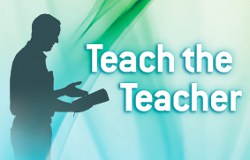Christian Education's Greatest Challenges, Part 2
 Republished, with permission, from Voice magazine, Jan./Feb. 2012. Read Part 1.
Republished, with permission, from Voice magazine, Jan./Feb. 2012. Read Part 1.
Perhaps the weakest part of our local churches’ Christian Education (CE) program is in the area of teacher training. So many churches appoint people and turn them loose without training them in the ministry they are asked to assume.
The CE workers are handling the Word of God. Do they know the Word? Do they know how to teach? Do they know something about the age group they’re teaching as well as some details about the administration and organization of the program in which they’re working? All too often they don’t.
When Paul wrote to Timothy in 2 Timothy 2:2, he gave Timothy the process for developing a strong ministry. Paul wrote, “Don’t build this work around yourself. This is not your work alone. You build the church by involving other people. You must train other people in the things that I have taught you, and in turn they will become good teachers also.” This is the greatest need we have in Christian Education today.
 Read
Read 
 Reprinted with permission from
Reprinted with permission from  Republished with permission from
Republished with permission from  Reprinted with permission from the
Reprinted with permission from the 
Discussion